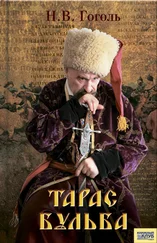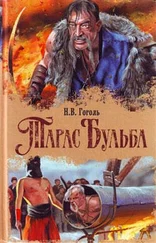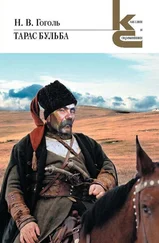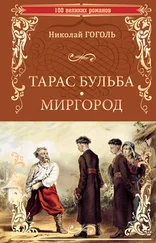| When the secretary presented the agreement, and the hetman put his hand to it, Taras drew a genuine Damascene blade, a costly Turkish sabre of the finest steel, broke it in twain like a reed, and threw the two pieces far away on each side, saying, |
Когда же полковой писарь подал условие и гетьман приложил свою властную руку, он снял с себя чистый булат, дорогую турецкую саблю из первейшего железа, разломил ее надвое, как трость, и кинул врозь, далеко в разные стороны оба конца, сказав: |
| "Farewell! |
- Прощайте же! |
| As the two pieces of this sword will never reunite and form one sword again, so we, comrades, shall nevermore behold each other in this world. |
Как двум концам сего палаша не соединиться в одно и не составить одной сабли, так и нам, товарищи, больше не видаться на этом свете. |
| Remember my parting words." As he spoke his voice grew stronger, rose higher, and acquired a hitherto unknown power; and his prophetic utterances troubled them all. "Before the death hour you will remember me! |
Помяните же прощальное мое слово (при сем слове голос его вырос, подымался выше, принял неведомую силу, - и смутились все от пророческих слов): перед смертным часом своим вы вспомните меня! |
| Do you think that you have purchased peace and quiet? do you think that you will make a great show? |
Думаете, купили спокойствие и мир; думаете, пановать станете? |
| You will make a great show, but after another fashion. They will flay the skin from your head, hetman, they will stuff it with bran, and long will it be exhibited at fairs. |
Будете пановать другим панованьем: сдерут с твоей головы, гетьман, кожу, набьют ее гречаною половою, и долго будут видеть ее по всем ярмаркам! |
| Neither will you retain your heads, gentles. |
Не удержите и вы, паны, голов своих! |
| You will be thrown into damp dungeons, walled about with stone, if they do not boil you alive in cauldrons like sheep. |
Пропадете в сырых погребах, замурованные в каменные стены, если вас, как баранов, не сварят всех живыми в котлах! |
| And you, men," he continued, turning to his followers, "which of you wants to die his true death? not through sorrows and the ale-house; but an honourable Cossack death, all in one bed, like bride and groom? |
- А вы, хлопцы! - продолжал он, оборотившись к своим, - кто из вас хочет умирать своею смертью -не по запечьям и бабьим лежанкам, не пьяными под забором у шинка, подобно всякой падали, а честной, козацкой смертью - всем на одной постеле, как жених с невестою? |
| But, perhaps, you would like to return home, and turn infidels, and carry Polish priests on your backs?" |
Или, может быть, хотите воротиться домой, да оборотиться в недоверков, да возить на своих спинах польских ксендзов? |
| "We will follow you, noble leader, we will follow you!" shouted all his band, and many others joined them. |
-За тобою, пане полковнику! За тобою!-вскрикнули все, которые были в Тарасовом полку; и к ним перебежало немало других. |
| "If it is to be so, then follow me," said Taras, pulling his cap farther over his brows. Looking menacingly at the others, he went to his horse, and cried to his men, "Let no one reproach us with any insulting speeches. |
- А коли за мною, так за мною же! - сказал Тарас, надвинул глубже на голову себе шапку, грозно взглянул на всех остававшихся, оправился на коне своем и крикнул своим: - Не попрекнет же никто нас обидной речью! |
| Now, hey there, men! we'll call on the Catholics." |
А ну, гайда, хлопцы, в гости к католикам! |
| And then he struck his horse, and there followed him a camp of a hundred waggons, and with them many Cossack cavalry and infantry; and, turning, he threatened with a glance all who remained behind, and wrath was in his eye. |
И вслед за тем ударил он по коню, и потянулся за ним табор из ста телег, и с ними много было козацких конников и пехоты, и, оборотясь, грозил взором всем остававшимся, и гневен был взор его. Никто не посмел остановить их. |
| The band departed in full view of all the army, and Taras continued long to turn and glower. |
В виду всего воинства уходил полк, и долго еще оборачивался Тарас и все грозил. |
| The hetman and leaders were uneasy; all became thoughtful, and remained silent, as though oppressed by some heavy foreboding. |
Смутны стояли гетьман и полковники, задумалися все и молчали долго, как будто теснимые каким-то тяжелым предвестием. |
| Not in vain had Taras prophesied: all came to pass as he had foretold. |
Недаром провещал Тарас: так все и сбылось, как он провещал. |
| A little later, after the treacherous attack at Kaneva, the hetman's head was mounted on a stake, together with those of many of his officers. |
Немного времени спустя, после вероломного поступка под Каневом, вздернута была голова гетьмана на кол вместе со многими из первейших сановников. |
| And what of Taras? |
А что же Тарас? |
| Taras made raids all over Poland with his band, burned eighteen towns and nearly forty churches, and reached Cracow. |
А Тарас гулял по всей Польше с своим полком, выжег восемнадцать местечек, близ сорока костелов и уже доходил до Кракова. |
| He killed many nobles, and plundered some of the richest and finest castles. The Cossacks emptied on the ground the century-old mead and wine, carefully hoarded up in lordly cellars; they cut and burned the rich garments and equipments which they found in the wardrobes. |
Много избил он всякой шляхты, разграбил богатейшие земли и лучшие замки; распечатали и поразливали по земле козаки вековые меды и вина, сохранно сберегавшиеся в панских погребах; изрубили и пережгли дорогие сукна, одежды и утвари, находимые в кладовых. |
| "Spare nothing," was the order of Taras. |
"Ничего не жалейте!" - повторял только Тарас. |
| The Cossacks spared not the black-browed gentlewomen, the brilliant, white-bosomed maidens: these could not save themselves even at the altar, for Taras burned them with the altar itself. |
Не уважали козаки чернобровых панянок, белогрудых, светлоликих девиц; у самых алтарей не могли спастись они: зажигал их Тарас вместе с алтарями. |
| Snowy hands were raised to heaven from amid fiery flames, with piteous shrieks which would have moved the damp earth itself to pity and caused the steppe-grass to bend with compassion at their fate. |
Не одни белоснежные руки подымались из огнистого пламени к небесам, сопровождаемые жалкими криками, от которых подвигнулась бы самая сырая земля и степовая трава поникла бы от жалости долу. |
| But the cruel Cossacks paid no heed; and, raising the children in the streets upon the points of their lances, they cast them also into the flames. |
Но не внимали ничему жестокие козаки и, поднимая копьями с улиц младенцев их, кидали к ним же в пламя. |
| "This is a mass for the soul of Ostap, you heathen Lyakhs," was all that Taras said. |
"Это вам, вражьи ляхи, поминки по Остапе!" -приговаривал только Тарас. |
| And such masses for Ostap he had sung in every village, until the Polish Government perceived that Taras's raids were more than ordinary expeditions for plunder; and Pototzky was given five regiments, and ordered to capture him without fail. |
И такие поминки по Остапе отправлял он в каждом селении, пока польское правительство не увидело, что поступки Тараса были побольше, чем обыкновенное разбойничество, и тому же самому Потоцкому поручено было с пятью полками поймать непременно Тараса. |
| Six days did the Cossacks retreat along the by-roads before their pursuers; their horses were almost equal to this unchecked flight, and nearly saved them. |
Шесть дней уходили козами проселочными дорогами от всех преследований; едва выносили кони необыкновенное бегство и спасали казаков. |




